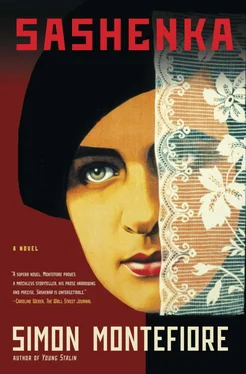“Feh, feh, dearest. What’s for dinner?”
“Kasha and cheese. We couldn’t get anything else. There’s nothing in the city to eat. Viktoria! Sophia! Your papa’s here!”
There was the thud of reluctant feet in heavy lace-up shoes. A girl stood in the doorway, peering at her father with sullen, muddy eyes as if he were a Martian.
“Hello, Papa,” said Viktoria, known as Vika.
“Darling Vika! How are you! How’s school? And that admirer of yours? Still writing you poems?”
He held open his arms but his darling fifteen-year-old daughter neither approached nor altered her expression.
“Mama’s very tired. She cries. You haven’t visited for a long time. We need money.”
Tall, olive skinned with lanky hair, wearing horn-rimmed spectacles and a dressing gown, Vika reminded Gideon of a censorious librarian. He could not get close to her.
“Where have you been?” the girl went on. “Drinking? Chasing women of easy virtue?”
“What a thing to accuse me of! Me? Of all people!” Gideon’s eyes fell. Even though his big mouth, dancing black eyes, wild hair and beard were made for grand gestures and belly laughs, he felt hollow and ashamed. Where did she get such a phrase as “women of easy virtue”? From that mother of hers of course.
“I’ve got homework to do,” said Vika, slouching away.
Gideon shrugged to himself: Vera was poisoning the children against him. Then he heard a cascade of light steps. Sophia, a dark girl with frizzy jet-black hair and eyes, threw herself into his arms. He stood up and whirled her round and round in her shabby nightshirt.
“Mouche!” he bellowed. “My darling Mouche!” That was Sophia’s nickname because when she was a baby she had resembled a mischievous fly. Now she was older, with black curls, black eyes and a strong jaw, she radiated energy just like her father.
“Where’ve you been? Is there a revolution? We saw a fight at the bakery! I want to be out there, Papa. Take me with you! How are your revolutionary friends? Did you see anything? I support the workers! How are you, Papa? Are you writing something? I’ve missed you. You haven’t been bad, have you? We hope not! We are very prissy here!” She wrapped herself around him like a monkey. “What are you writing, you old papa momzer ?”
He loved the way she called him “papa scallywag” in Yiddish and tickled his beard. “Shall we write something now, Mouche? I owe them a quick article.”
“Oh yes!” Mouche took his hand and dragged him into the study, where it was difficult to step without knocking over piles of papers and journals—yet the fleet Mouche dodged them all and pulled out his green leather chair, adeptly placed the paper on the typewriter and wound it into position.
“ Pravilno! Right!” he said.
“Now, who are we writing for today? The Kadets? The Mensheviks?”
“The Mensheviks!” he replied.
“So you’re a Social Democrat this week?” she teased her father.
“This week!” He laughed at himself.
“How many words?”
“Five hundred, no more. Do we have something to drink?”
Mouche scurried off to get a thimble of vodka.
He swigged it and sat down in the chair.
Mouche settled into his lap, rested her hands on his arms and cried out: “Type, Papa, begin! How about this? ‘The regime’s reactionary follies are almost played out.’ Or ‘In the streets, I saw a hungry wraith of a woman, a worker’s widow, shake her baby at a rich war profiteer.’ Or…”
“You’re so like me,” he said, kissing her forehead.
Gideon was one of those journalists who, in a few minutes, could dash off an article decorated with ringing phrases and sharp reportage, without any real effort. Since he could never quite make up his mind whether he was a Constitutional Liberal (a Kadet) or a moderate Social Democrat (a Menshevik), he wrote for both their newspapers and several other journals, using different names. He had traveled widely and his pieces contained references to foreign cities and forgotten wars that impressed the reader. His phrases, so carelessly constructed, often hit home. People repeated them. Editors asked for more. He never regretted that he had let Samuil buy him out of the family business, though if he had kept his share he would now be a very rich man. He regretted nothing. Besides, money never stuck to his fingers.
He had promised the Menshevik editor a rousing article that evening on the atmosphere in the streets. Now, with Mouche excitedly feeling the tendons in his brawny arms as he typed, he worked fast, fingers banging into the keys and crying out, “Return!” at the end of each line. Then Mouche returned the typewriter to begin another line, humming to herself with enjoyment, jiggling her knees with nervous energy.
“There,” he said. “Done. Your papa’s just earned himself a few rubles for that.”
“Which we never see!” said Vera from the doorway.
“I might just surprise you this time!” Gideon was feeling virtuous. He had enough cash to pay off the debts, satisfy Vera, buy the girls new books and dresses, and some fine meals. He looked forward to handing over the mazuma : Vera would smile at him; Mouche would dance; even Vika would love him again.
When Vera served the kasha, a buckwheat porridge, sprinkled with goat’s cheese, she again asked about the money, not mentioning there was a revolution afoot. Outside, the factory sirens started to blare and whine; a shot, more shots and then a barrage rang out; stolen cars raced down the streets, skidding, grinding their gears as peasants enjoyed their first driving lessons.
“Is Sashenka really a Bolshevik, Papa? How’s Aunt Ariadna? Is it true the doctor prescribed her opium?” Mouche asked questions and hummed to herself as he tried to answer them. Vika glared at her father each time her mother pressed her lips together, sighed or sniffed sanctimoniously.
No one could ruin a meal for Gideon. Whether it was kasha in his dreary apartment or a sturgeon steak at the Contant, he was a vigorous trencherman, recounting the family news, smacking his lips, sniffing the nosh like a happy dog and soiling his beard without the slightest embarrassment.
“You don’t eat as you taught us to eat,” said Vika. “Your manners are terrible, aren’t they, Mama?”
“Don’t do as I do,” replied Gideon. “Do as I say!”
“How can you tell the children that?” asked his wife.
“It’s hypocrisy,” said Vika.
“You two are a regular trade union of sulking women! Cheer up,” said Gideon, putting his feet up on a filthy chair, already marked by his boots on other occasions.
“No more jokes, Gideon,” said Vera, sending Vika and Mouche to do their homework.
The moment he was alone with Vera, everything changed. Her drawn sallow face, made for martyrdom, irritated him. She was always wiping her nose with a green-stained rag. Her prissiness maddened him. He adored his daughters—or rather he adored Mouche—but what had happened to Vera? A child of the provincial bourgeois, the daughter of a Mariupol schoolteacher, she had been educated, an intellectual who worked on the literary journal Apollo , full of vim and enthusiasm, with a high bosom, blue eyes and golden hair. Now the bosom hung around her waist like udders, the eyes were watered down to a tepid pallor, and the hair was greying. How he had been so foolish as to get her pregnant again, he could barely believe! But on Mouche’s birthday he had been overcome with a sort of erotic nostalgia for how she had been, forgetting how she was now. The fact that he himself had done this to her and that he felt guilty about it made him resent her all the more.
Only Mouche delighted him, and he decided that when she was a little older he would invite her to live with him. As for now, he could hardly stand it here another moment. Great events were taking shape on the streets; parties were throbbing in the hotels; a writer must see history being made; and he was stuck here with this straitlaced harridan.
Читать дальше












